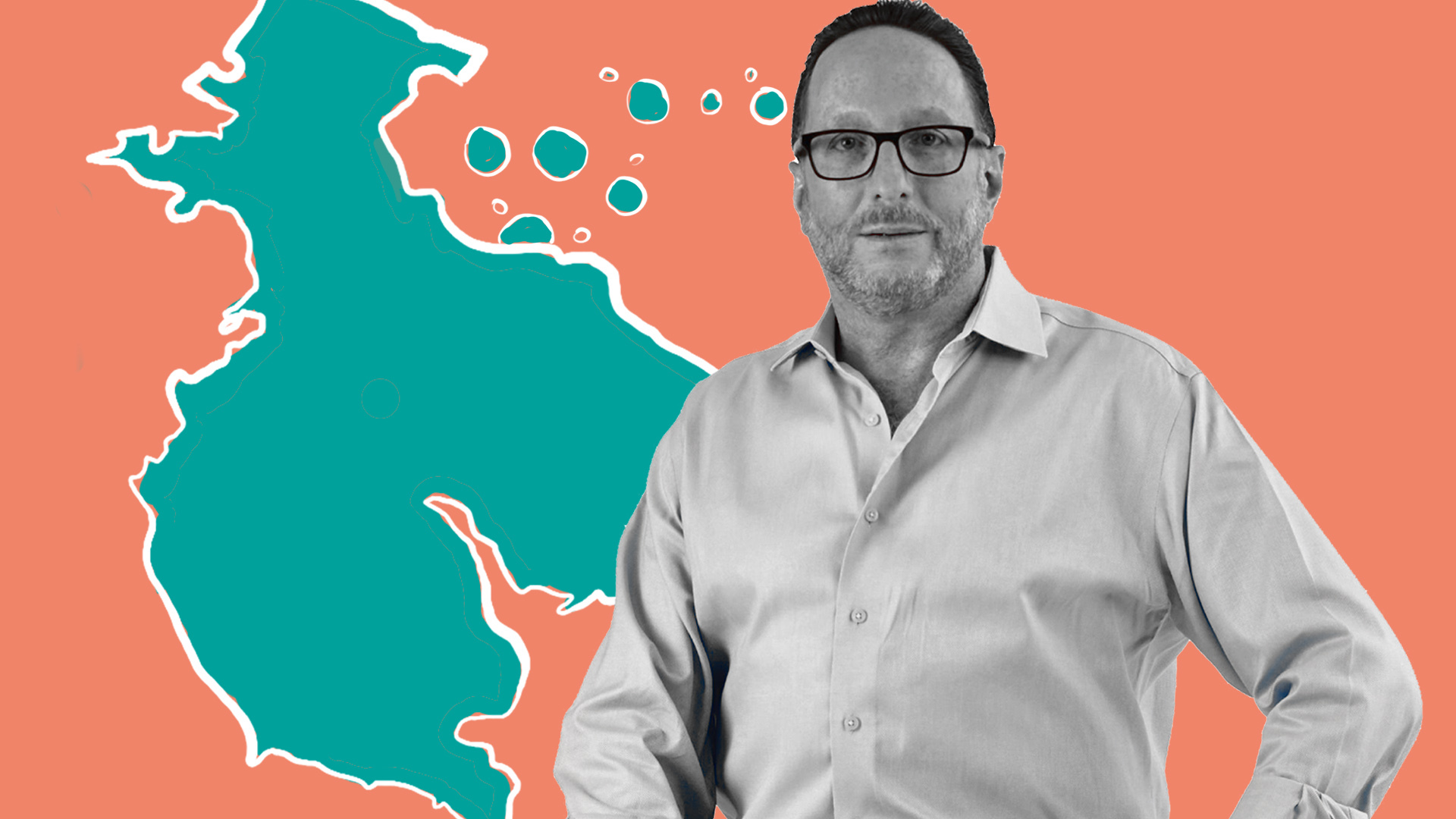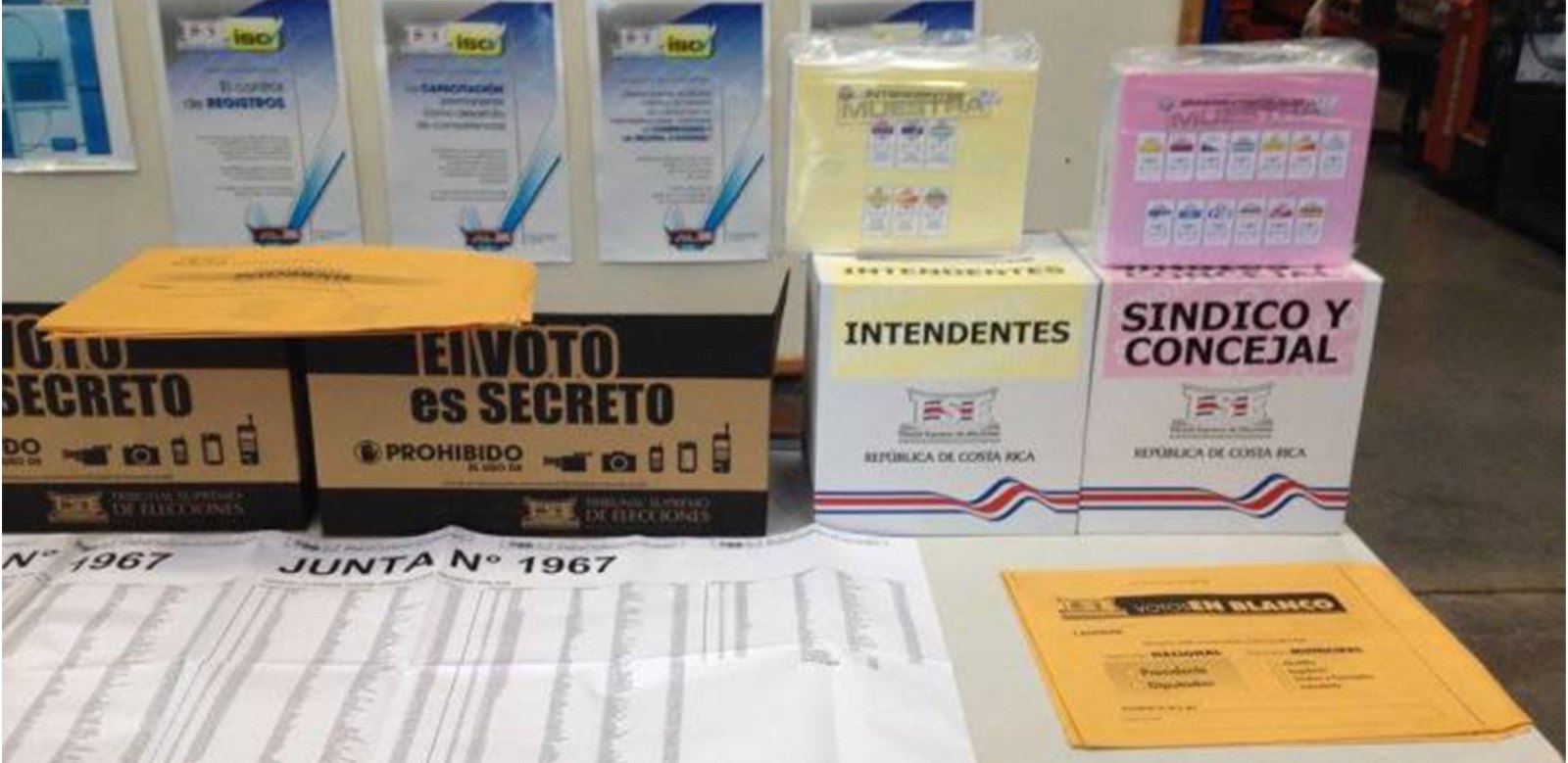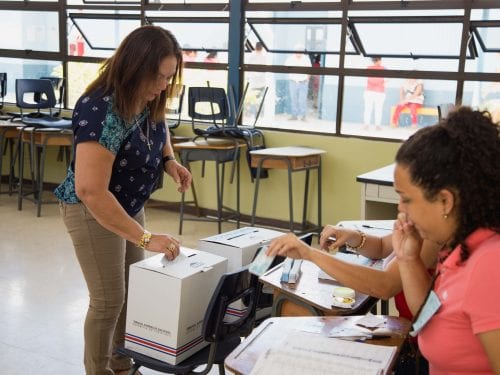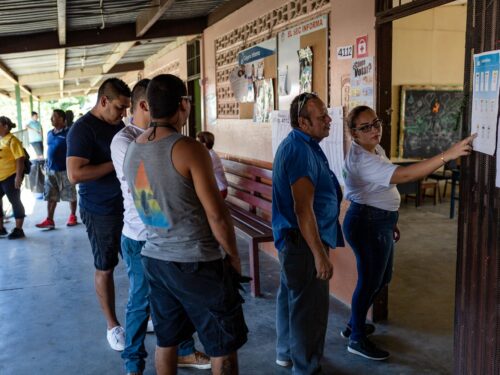
Eliecer Feinzaig was vice minister of transportation during the government of Miguel Angel Rodriguez (1998-2002) and has analyzed the country’s economic policies on news and opinion programs for years.
Now he’s the head of the Liberal Progressive Party (PLP for the Spanish acronym), founded in 2016. As of yet, the party hasn’t been successful in its attempts to get figures elected to municipal offices, congress or the executive branch.
Feinzaig, however, isn’t some unknown candidate. In the poll published in December by the Center for Research and Political Studies (CIEP-UCR), he ranked sixth among candidates that people intend to vote for, above Welmer Ramos, the candidate from Citizen Action, the current president’s party.
For Guanacaste, Maria Elena Paniagua, an educator who was the first female mayor of Santa Cruz (2002-2006), is running for a seat with PLP. She isn’t unknown in the national political arena either. In the 2018 elections, she was a candidate for legislator for the Christian Social Republican Party.
The Voice spoke with Feinzaig during one of his visits to Guanacaste in August of 2021. In a hotel where he stayed in Santa Cruz during the tour of the province, he spoke about his vision of attracting more free trade zones to the province, of a policy that leans away from prohibiting things and that bets on alliances with the private sector to promote development.
The interview was edited in length to improve readability.
Can you list the four main challenges that the province faces?
Well, I would say that the first one is the issue of employment, security problems, the competitiveness of the agricultural sector and the fourth, at this time, is the issue of reactivating tourism.
Regarding employment and reactivating tourism, how do you propose generating it in the province?
Well, we have presented a proposal to eliminate 90 taxes, within which we are considering temporarily eliminating taxes from the Costa Rican Institute of Tourism (ICT for the Spanish acronym) and the 13% tax on tourist services. We’ve also discovered taxes that make no sense, import taxes on agricultural goods, import taxes on veterinary medicines. So within that proposal, we are attacking both the tourism aspect and the agriculture and livestock aspect. Remind me what the question was.
The question was how to create more employment. Also in what areas, because right now you mention tourism and the agricultural sector, but do you think that Guanacaste should be aiming to stay in these two areas?
No, that’s like reactivating with what there is today. We have a proposal to create free trade zones in the coastal provinces, in particular targeting agrotechnology. Given the profile of unemployed, we need to generate investment in light manufacturing that can hire this type of personnel, unlike the more sophisticated processes that are being carried out in the Central Valley. This is to generate employment in the short term, because a lot of time passes while we solve the problem of education so that people can access better or more sophisticated jobs.
What is killing employment and what is also killing formal [employment] is the excessive cost of social security contributions. So we have a proposal, and this is at the national level, but it’s going to have a very particular impact in peripheral areas, which is to reduce the Social Security Fund’s operating costs, expanding the experiment that the Fund has already carried out with the EBAIS offices administered by cooperatives and universities that operate at a lower cost than the EBAIS operated by the Fund.
Administered by cooperatives and universities?
In the case of hospitals, it’s probably also necessary to incorporate companies with experience in hospital administration because it’s already a much more complex operation. But yes, that’s the idea. They’ll continue to be public health centers that citizens have access to by being enrolled with the Fund. They won’t be able to charge you extra. It’s not a private hospital, but they’ll be managed in a better way at a lower cost.
In line with what you mentioned about education, do you have any proposals to bring greater educational opportunities to the coastal areas?
Yes, in fact we’re making a proposal that is going to be controversial, but it’s necessary and involves sitting down with the universities and telling them: Well, if we want money from the state, let’s have the universities and the government sit down together to make a plan so that the universities begin to offer the courses that the market demands, but also to take them to the regional campuses and to every corner of the country, so that it’s accessible to all youth. In any case, it’s not enough for the regional campuses to teach, let’s say, technical or engineering careers here, because if there aren’t any job offers [in those fields] in Guanacaste, they’re still going to end up moving somewhere else just the same.
Students are behind in a giant way in recent years: pandemic, strikes and everything else. Add to this the educational infrastructure in the province, affected mainly by the Samara earthquake. How would you support primary and secondary education to get back on track?
We have tremendous resources available to bring the internet to every school and every student, and the resources are shelved. The 8 percent for education is a huge amount, more than enough, but it’s highly concentrated in primary and university, neglecting preschool education and especially secondary education. So we’d do a reorganization of that budget. In the specific case of Guanacaste, we also have the issue of language, because the complaint that we receive repeatedly is that the [quality] of English education is quite poor, both in elementary schools in MEP (Ministry of Public Education) or high schools, as well as in INA (National Learning Institute) centers.
Do you think that has to do with the quality of the professionals?
Definitely, and I’m not the one saying it; the Ministry itself says it. The few times that they’ve managed to do teacher evaluations, they’ve determined that, I don’t remember now, about 70 percent of English teachers aren’t proficient in the language. As people say, they teach English in Spanish, right?
Returning to the issue of employment and security, many of the fishermen face insecurity due to illegal fishing and the unemployment situation. Have you analyzed some proposals yet for the fishing sector?
Yes, we’ve been trying to promote a project in the commission of the Legislative Assembly’s Environmental Commission. There’s a 45-mile strip where seine-haul fishing vessels can’t enter. We believe that this strip is too narrow because longline fishing has to compete there and traditional fishing has to compete. Sport fishing has to compete there. And so we’ve proposed widening it to 100 miles. What do we gain from it? Separating these fleets a little.
And speaking about these projects that the current legislative branch and also the executive branch have, are there any of those projects that you think are important to sustain, maintain and support?
Well, I’d say that the fiscal rule is one of the few things this government has done that is redeemable. Under a PLP government, we’ll make sure there is strict compliance with the fiscal rule because our proposal revolves precisely around creating an environment of confidence in the Costa Rican economy so that producers, small entrepreneurs, farmers, large companies they feel that it’s worth investing in the country, and that confidence first comes from having clear rules and that those rules are followed.
At least in these last two government administrations, they’ve kicked around the issue of traditional mining and Costa Rica had already signed the Minamata agreement years ago to eliminate or reduce the use of mercury, but that permit continues to get extended and we still see it being discussed in the assembly today. What’s going to happen with them in your possible government?
Allow me to also mention the issue of Crucitas, because when you design public policy, you have to do it with your brain and not with your heart. In Costa Rica, we see things purely with our heart. Crucitas, a very lovely area, and green macaws nest there and everything else. Let’s do a total ban and see what it results in, because never in the history of mankind have bans worked.
What we’d cause is a much bigger environmental disaster than if we’d made an organized concession for extracting gold. Certainly we can’t abandon the traditional miners, but there are technologies developed in the world that allow for the extraction of gold with traditional techniques that don’t use mercury and that aren’t as harmful to human health and to the health of the ecology, the environment.
That commitment to teach other techniques has existed in government administrations, but it’s never put into practice.
That’s because these last two government administrations don’t really have any interest in mining taking place. They’re governments that don’t have the slightest problem with leaving people without work. See what happened to trawling, and I oppose trawling. I think it’s a disaster. What is done by trawling is ecological murder . But you can’t simply ban trawling. What do the fishermen do, the shrimp, what do the shrimp peelers do, right? So if you’re going to ban it because it’s an absolute necessity, you have to first help these people to reinvent themselves, to do some other activity.
Every year, we also see how much communities like Nosara suffer from the impacts of climate change. How can the pounding it gives the most vulnerable communities be lessened?
Our environmental policy focus is towards adaptation to climate change, preparing the country for climate change and building resilience. This implies that the dimension of climate change must be considered in all public works projects in order to protect that work from the potential onslaughts of nature. So we aren’t going to be able to stop the floods, we aren’t going to be able to stop the swelling of the rivers and the torrential rains, but we can shield the infrastructure so that when these events occur, they don’t cause such great damage.
There’s another situation in the province that we’re following with concern and that is the issue of immigration, not only an immigration from Nicaragua to Costa Rica, but also the migration of people who come from Africa and other places beyond the continent and who are on their way to the United States. How would you deal with immigration?
We can deceive ourselves and think that if we provide the borders, we’re going to prevent them from entering and we’ll spend a fortune on a lost war. Or we can create the conditions so that when these people enter, they come and right away are incorporated into the country’s formal economy, that they can come to contribute to the country and not that they come informally, much less that they come to become a burden or an additional load for Costa Rican society. If the reality is that agricultural producers are having a hard time finding Costa Rican labor, that they no longer want to do these tasks, then it is necessary that Nicaraguans or Panamanians come to work in these tasks. So let’s make sure they do it legally. Let’s let them become formalized.







Comments